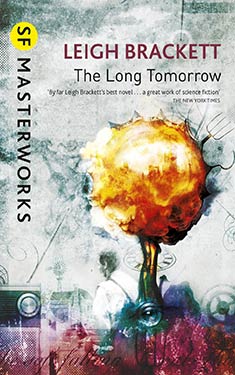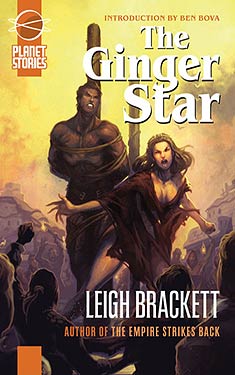WoGF Review: The Long Tomorrow by Leigh Brackett
 Scott Lazerus came to Worlds Without End looking for a good list of books. He found David Pringle’s Best 100 Science Fiction Novels to his liking and is currently working his way through the list. He has posted many fine reviews for WWEnd including several for last year’s GMRC. Be sure to check out Scott’s excellent blog series Forays into Fantasy too!
Scott Lazerus came to Worlds Without End looking for a good list of books. He found David Pringle’s Best 100 Science Fiction Novels to his liking and is currently working his way through the list. He has posted many fine reviews for WWEnd including several for last year’s GMRC. Be sure to check out Scott’s excellent blog series Forays into Fantasy too!
 One possible definition of science fiction is that SF is about the potential effects of technology on humanity and the human environment. The potential of technology can create the “sense of wonder” that SF readers are often looking for, but technology can also be seen as a potential danger. Out of hand or out of our control, technology can become the source of our destruction—thus the cautionary dystopias of nuclear apocalypse and climate change that appear alongside more hopeful stories of space exploration and other wonders of the future.
One possible definition of science fiction is that SF is about the potential effects of technology on humanity and the human environment. The potential of technology can create the “sense of wonder” that SF readers are often looking for, but technology can also be seen as a potential danger. Out of hand or out of our control, technology can become the source of our destruction—thus the cautionary dystopias of nuclear apocalypse and climate change that appear alongside more hopeful stories of space exploration and other wonders of the future.
Leigh Brackett plays with this dichotomy masterfully in The Long Tomorrow (1955), the story of two teenage cousins brought up in Piper’s Run—a community of “New Mennonites” in Ohio eighty years after a nuclear war destroyed most U.S. cities. (The details of the war itself are not presented, but apparently the U.S. “won”, for whatever it’s worth.) In the aftermath of the Destruction, as the nuclear devastation has come to be known, fundamentalist religious groups have gained political power, enforcing, with popular support, an anti-technological society supported by the Thirtieth Amendment to the Constitution, which prohibits the growth of any town’s population beyond one thousand people, or the number of buildings beyond two hundred per square mile. The cultural mores of the Amish and the Mennonites dominate America, and more violent anti-technology sects threaten death by stoning for anyone caught with illegal technology—“the terror brought the great boiling up of faith that birthed new sects and strengthened the old ones.”
WoGF Review: The Ginger Star by Leigh Brackett
 Rhonda Knight is a frequent contributor to WWEnd through her many reviews and her excellent blog series Automata 101 and Outside the Norm. Ronda is an Associate Professor of English at Coker College in Hartsville, SC. She teaches Medieval and Renaissance literature as well as composition courses.
Rhonda Knight is a frequent contributor to WWEnd through her many reviews and her excellent blog series Automata 101 and Outside the Norm. Ronda is an Associate Professor of English at Coker College in Hartsville, SC. She teaches Medieval and Renaissance literature as well as composition courses.
 One of the intended or unintended consequences of the WoGF page is that viewers are faced with rows upon rows of authors’ faces, which they don’t always recognize. Often when I see the face of an author that another participant has chosen, I think “What an interesting face? Who is she?” This is the way that I chose my “random read.” As I was trolling along, I saw the face of Leigh Brackett (1915-1978) and thought “She looks interesting.” I was not wrong. The link to her WWE bio hinted that Brackett was a significant foremother for many of the other women whose faces look out at us from the WoGF page.
One of the intended or unintended consequences of the WoGF page is that viewers are faced with rows upon rows of authors’ faces, which they don’t always recognize. Often when I see the face of an author that another participant has chosen, I think “What an interesting face? Who is she?” This is the way that I chose my “random read.” As I was trolling along, I saw the face of Leigh Brackett (1915-1978) and thought “She looks interesting.” I was not wrong. The link to her WWE bio hinted that Brackett was a significant foremother for many of the other women whose faces look out at us from the WoGF page.
While I don’t want to turn this into a biography rather than a review of The Ginger Star, I would like to discuss a little of what I learned about Leigh Brackett that makes me award her foremother status. Early in her career, Brackett wrote both science fiction and detective stories for such pulps as Astounding Science Fiction, Thrilling Detective and New Detective. Her first novel was a hard-boiled detective tale, No Good from a Corpse, which has been hailed by critic Bill Pronzini as more like Raymond Chandler’s writing than Chandler’s own. (I have since read this novel and agree that it is a great example of the hard-boiled detective.) This novel served as Brackett’s entrance into Hollywood and scriptwriting. The story goes like this: After reading No Good from a Corpse, the legendary director Howard Hawks said “this guy Brackett–he’d be good to write the screenplay of The Big Sleep with Bill Faulkner.” Although Hawks was surprised that a woman appeared in response to his offer, he hired her and began a long professional relationship with her. She was a screenwriter for many other Hawks directed films, including the John Wayne vehicles, Rio Bravo (1959), Hatari! (1962), El Dorado, (1966), and Rio Lobo (1970). In addition, she wrote the satiric screenplay based on Chandler’s novel The Long Goodbye (1973), directed by Robert Altman. She had completed a first draft of The Empire Strikes Back for George Lucas just before she died, and he dedicated the movie to her posthumously. Her version of the movie is here.



















 Full Details
Full Details

